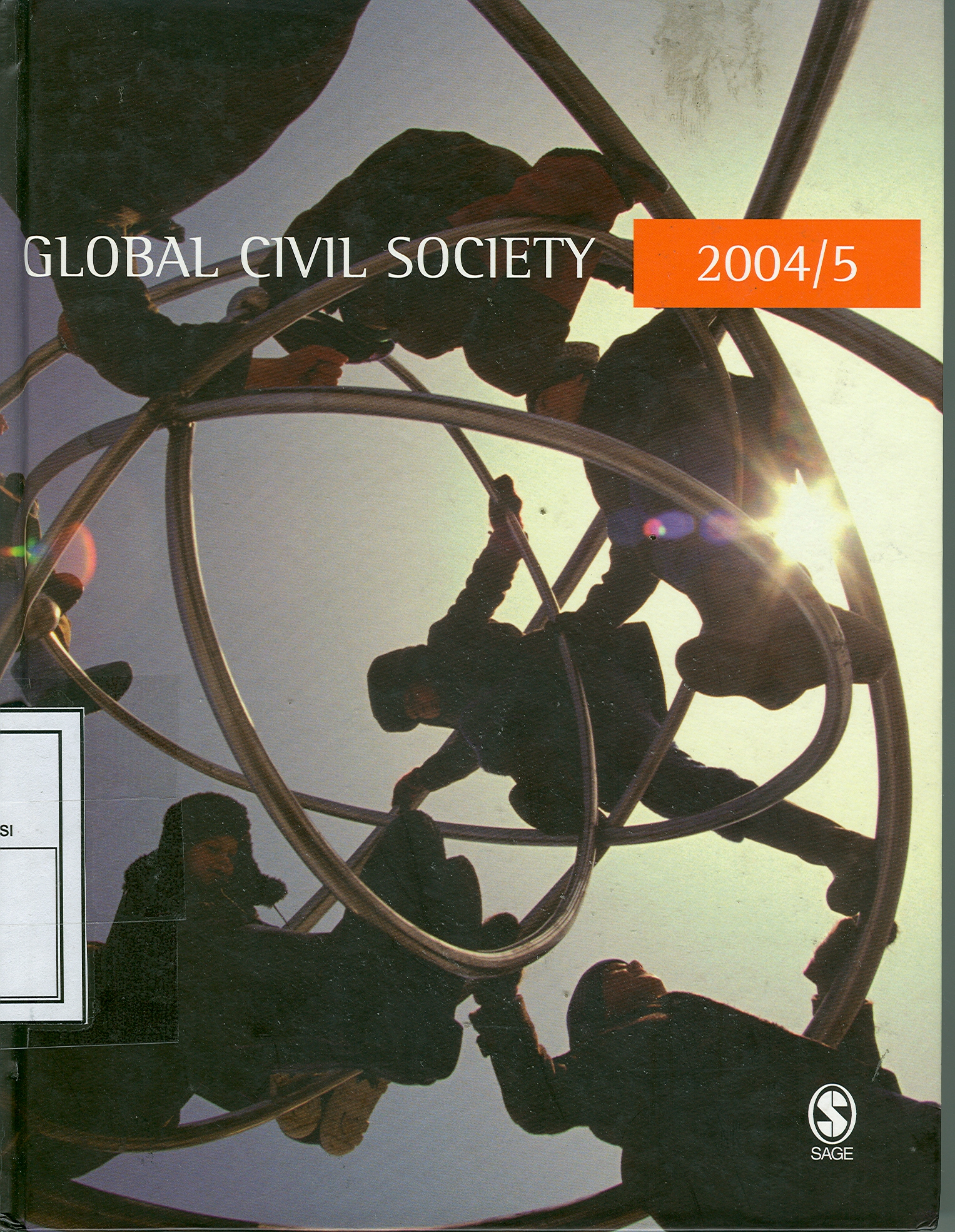
| Judul | Global Civil Society 2004/5 / Edited by Helmut Anheier, Marlies Glasius, and Mary Kaldor |
| Pengarang | Global Civil Society 2004/5 |
| EDISI | Cet.1. |
| Penerbitan | London : Sage Publication, 2005 |
| Deskripsi Fisik | xiii, 375 hlm.; 24 cm ;24 cm |
| ISBN | 1-4129-03 06-8 |
| Subjek | Oil and activism Recasting democracy Middle Eastern Perspectives; Global diving |
| Abstrak | The war in Iraq brought global politics into the living rooms of ordinary people around the world in 2003/4. This defining event, which influenced the domestic agenda in many countries, may change the way people perceive power and the politics of power. The Global Civil Society Yearbook shows how those perceptions can be shaped by the huge diversity of individuals, movements, NGOs, networks - and the ideas and values they represent - acting across borders and beyond national politics. Now in its fourth year of publication, the Global Civil Society Yearbook is the standard work on the topic, essential reading for social and political scientists, activists, students, journalists and policy makers. Global Civil Society 2004/5 adopts an unorthodox approach to major geo-political issues including oil, the Middle East and democracy. Yahia Said examines oil and activism, Mohamed EI Sayed-Said explores Middle Eastern perspectives, and Heba Raouf Ezzat outlines a new multicultural approach to global civil society. The emergence of what Mary Kaldor calls 'a new kind of global politics' has implications for sovereignty and democracy, which Global Civil Society 2004/5 tackles head-on. Hilary Wainwright identifies ~he conditions in which global civil society can strengthen and reinvigorate local democracy. In contrast, Kenneth Anderson and David Rieff question global civil society's claim to represent world opinion, arguing that the hotchpotch of envi!onmental groups, feminist networks and human rights activists are merely undemocratis and unaccountable 'social movement missionaries. Global Civil Society 2004/5 includes a wealth of data on globalisation, the rule of law, NGO growth, people's values and attitudes, governance and civil liberties, plus a chronology of the myriad conferences, campaigns and protests that are the si~ews of global civil society. |
| Catatan | Indeks : Indeks |
| Bahasa | Inggris |
| Bentuk Karya | Tidak ada kode yang sesuai |
| Target Pembaca | Tidak ada kode yang sesuai |
| Tag | Ind1 | Ind2 | Isi |
| 001 | INLIS000000000005191 | ||
| 005 | 20221013012035 | ||
| 008 | 221013################|##########|#eng## | ||
| 020 | # | # | $a 1-4129-03 06-8 |
| 035 | # | # | $a 0010-0520005191 |
| 041 | $a eng | ||
| 082 | # | # | $a 303 |
| 084 | # | # | $a 303 GLO |
| 100 | 0 | # | $a Global Civil Society 2004/5 |
| 245 | 1 | # | $a Global Civil Society 2004/5 /$c Edited by Helmut Anheier, Marlies Glasius, and Mary Kaldor |
| 250 | # | # | $a Cet.1. |
| 260 | # | # | $a London :$b Sage Publication,$c 2005 |
| 300 | # | # | $a xiii, 375 hlm.; 24 cm ; $c 24 cm |
| 500 | # | # | $a Indeks : Indeks |
| 520 | # | # | $a The war in Iraq brought global politics into the living rooms of ordinary people around the world in 2003/4. This defining event, which influenced the domestic agenda in many countries, may change the way people perceive power and the politics of power. The Global Civil Society Yearbook shows how those perceptions can be shaped by the huge diversity of individuals, movements, NGOs, networks - and the ideas and values they represent - acting across borders and beyond national politics. Now in its fourth year of publication, the Global Civil Society Yearbook is the standard work on the topic, essential reading for social and political scientists, activists, students, journalists and policy makers. Global Civil Society 2004/5 adopts an unorthodox approach to major geo-political issues including oil, the Middle East and democracy. Yahia Said examines oil and activism, Mohamed EI Sayed-Said explores Middle Eastern perspectives, and Heba Raouf Ezzat outlines a new multicultural approach to global civil society. The emergence of what Mary Kaldor calls 'a new kind of global politics' has implications for sovereignty and democracy, which Global Civil Society 2004/5 tackles head-on. Hilary Wainwright identifies ~he conditions in which global civil society can strengthen and reinvigorate local democracy. In contrast, Kenneth Anderson and David Rieff question global civil society's claim to represent world opinion, arguing that the hotchpotch of envi!onmental groups, feminist networks and human rights activists are merely undemocratis and unaccountable 'social movement missionaries. Global Civil Society 2004/5 includes a wealth of data on globalisation, the rule of law, NGO growth, people's values and attitudes, governance and civil liberties, plus a chronology of the myriad conferences, campaigns and protests that are the si~ews of global civil society. |
| 650 | 4 | $a Middle Eastern Perspectives; Global diving | |
| 650 | 4 | $a Oil and activism | |
| 650 | 4 | $a Recasting democracy | |
| 990 | # | # | $a 00019/MKRI-P/IV-2007 |
| 990 | # | # | $a 00019/MKRI-P/IV-2007 |
| 990 | # | # | $a 06012/MKRI-P/I-2007 |
| 990 | # | # | $a 06012/MKRI-P/I-2007 |
Content Unduh katalog